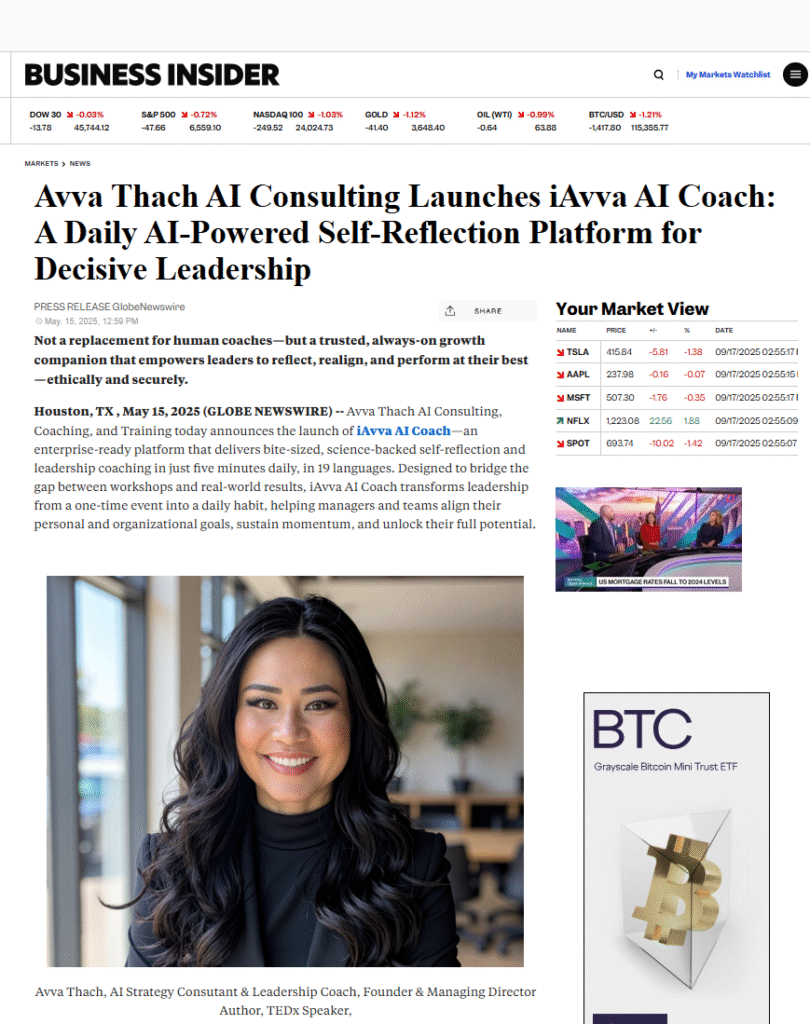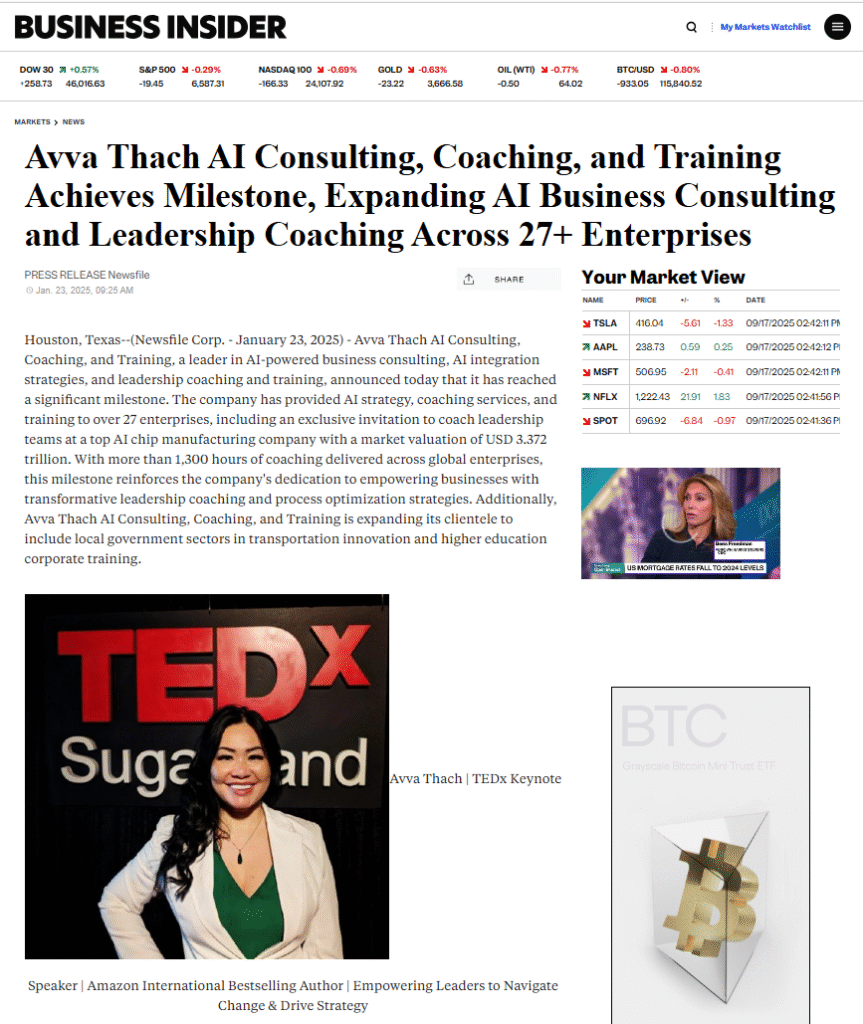Building Tomorrow’s Leaders: The Essential Guide to Leadership Mentoring
Building Tomorrow’s Leaders: The Essential Guide to Leadership Mentoring
Introduction
Welcome to the future of leadership mentoring, where we’re not just preparing leaders for tomorrow, but helping them to thrive in an ever-evolving landscape. In an age where change is the only constant, the need for effective leadership has never been more critical. Whether you’re a seasoned executive or an emerging leader, understanding the nuances of leadership mentoring can be your secret weapon.
Think of leadership mentoring as your personal GPS for career development. Just like a GPS navigates through winding roads and unexpected detours, a good mentor helps you steer through the complexities of leadership challenges. They provide guidance, share valuable insights, and help you avoid common pitfalls on your path to success.
Did you know that 75% of companies believe effective training and coaching are essential for successful digital transformation? (PwC)
The modern business environment is like a high-stakes game of chess strategic moves can lead to victory, while missteps can cost dearly. This is where leadership coaching comes into play. It’s not just about imparting knowledge; it’s about fostering an environment that encourages growth and innovation.
In this guide, we’ll explore various facets of leadership mentoring, from understanding its importance in today’s corporate climate to practical strategies for implementing effective mentorship programs. We’ll also delve into how these programs can enhance your organization’s overall performance and drive transformational change.
So buckle up! We’re about to embark on a journey that will equip you with the tools needed to cultivate tomorrow’s leaders today. Let’s dive into the world of mentorship and discover how it can shape not just individual careers but entire organizations.

Understanding Leadership Mentoring
Leadership mentoring is like having a personal GPS for your career journey. It’s not just about getting from point A to point B; it’s about navigating the twists, turns, and occasional roadblocks with the guidance of someone who’s been there before. But what exactly does this entail?
Definition of Leadership Mentoring
At its core, leadership mentoring involves a seasoned leader (the mentor) guiding a less experienced individual (the mentee) through the complexities of leadership roles. This relationship is built on trust and mutual respect, focusing on developing leadership skills, enhancing career trajectories, and fostering professional growth.
Importance in Today’s Business Environment
In an era where change is the only constant, effective leadership is crucial for organizational success. Here’s why leadership mentoring is more important than ever:
- Accelerated Learning: Mentees gain insights from their mentors’ experiences, avoiding common pitfalls.
- Cultivating Future Leaders: Organizations can identify high-potential employees and prepare them for leadership roles through targeted mentorship programs.
- Enhanced Engagement: Employees who participate in mentorship programs often report higher job satisfaction and commitment to their organization.
- Diversity and Inclusion: Mentorship can also promote diversity in leadership by providing underrepresented groups with access to guidance and support.
This strategic approach not only benefits individual leaders but also enhances overall organizational performance. With effective mentorship in place, businesses can foster an environment that prioritizes continuous learning and development.
The Role of Leadership Coaching in Mentoring
When it comes to leadership mentoring, the interplay between coaching and mentoring is like a well-choreographed dance. They complement each other beautifully, but they are distinct in their roles and impacts. So, let’s break it down!
Differentiating Between Coaching and Mentoring
At first glance, coaching and mentoring might seem like two peas in a pod, but they cater to different needs:
- Coaching: This is often a more structured process focused on developing specific skills or achieving particular goals. Think of it as a GPS guiding you through the winding roads of leadership development.
- Mentoring: This is more about building relationships over time, offering wisdom drawn from experience. It’s like having a wise owl by your side, helping you navigate the forest of corporate challenges.
Benefits of Leadership Coaching for Emerging Leaders
The benefits of integrating leadership coaching into your mentoring programs are profound:
- Personalized Growth: Tailored coaching sessions can address individual challenges faced by emerging leaders, enhancing their unique strengths.
- Skill Enhancement: Leadership coaching focuses on key areas such as conflict resolution and effective communication essential skills for any leader aiming for success.
- Accelerated Development: By combining coaching with traditional mentoring, organizations can fast-track their leaders’ journey toward executive roles.
- Cultural Alignment: Leadership coaching helps align personal values with organizational goals, fostering a cohesive culture that supports growth and innovation.
A great example of this synergy can be found in organizations that adopt high potential leadership programs. These programs often pair emerging leaders with seasoned coaches who provide ongoing support while also facilitating mentorship relationships. This dual approach ensures that leaders are not only prepared for current challenges but are also equipped for future leadership roles.

In conclusion, integrating leadership coaching into your mentorship framework isn’t just beneficial it’s essential. It transforms traditional mentorship into a powerhouse of professional growth, ensuring that tomorrow’s leaders are not just ready to lead but are equipped to inspire!
Key Components of Effective Leadership Mentoring Programs
Creating a successful leadership mentoring program is like assembling a gourmet recipe. You need the right ingredients, precise measurements, and a dash of creativity to cook up future leaders. Let’s break down the key components that make these programs sizzle.
Structured Frameworks for Success
A well-defined structure is essential for any mentoring program. Think of it as the blueprint for a skyscraper; without it, things can get shaky. A structured framework ensures:
- Clear Processes: From onboarding mentors and mentees to setting meeting schedules, clarity is vital.
- Consistent Evaluation: Regular check-ins and assessments help measure progress and adapt strategies.
- Resource Availability: Providing tools and materials enhances learning opportunities.
Identification of Goals and Objectives
If you don’t know where you’re going, any road will take you there! Establishing clear goals helps both mentors and mentees stay focused on their journey. Key steps include:
- SMART Goals: Specific, Measurable, Achievable, Relevant, Time-bound objectives guide the mentoring relationship.
- Alignment with Organizational Vision: Ensure that personal development goals align with broader business objectives for maximum impact.
- Regular Reassessment: Goals should evolve as both parties grow; flexibility is crucial in mentorships.
Matching Mentors with Mentees
The right match can be the difference between a successful partnership and a mentoring mismatch. Consider these factors when pairing up:
- Cultural Fit: Mentors should resonate with mentees’ backgrounds and values to foster trust.
- Skill Alignment: Ensure mentors possess relevant expertise in areas where mentees seek growth think of it as matching puzzle pieces!
- Diversity of Perspectives: Encourage cross-functional or cross-cultural pairings to enhance learning through varied insights.
Did you know? Effective leadership mentoring programs can boost employee satisfaction by 50% according to recent studies!
The success of your leadership mentoring program hinges on these key components. By establishing robust frameworks, identifying clear goals, and ensuring thoughtful mentor-mentee pairings, organizations can cultivate an environment ripe for growth and transformation. Remember: building tomorrow’s leaders starts today!
Transformational Leadership Mentoring Strategies
When it comes to leadership mentoring, the transformational approach is like the secret sauce that can elevate a good mentor-mentee relationship into something extraordinary. Think of it as upgrading from a flip phone to the latest smartphone you get all these new features that make communication smoother and more effective!
Here are some key strategies that can help you cultivate a transformational leadership mentoring environment:
- Building Trust and Rapport in Relationships: Trust is the bedrock of any successful mentorship. Establishing a safe space where mentees feel comfortable sharing their thoughts and challenges is crucial. This means being transparent, showing vulnerability, and actively listening. Remember, it’s not just about imparting knowledge; it’s about creating a connection.
- Cultivating Emotional Intelligence in Leadership: Transformational leaders excel at understanding emotions both their own and those of others. Encourage mentees to develop their emotional intelligence (EQ) by engaging in self-reflection and empathetic listening. This not only enhances personal development in leadership but also fosters better team dynamics.
- Effective Communication Techniques in Mentorships: Clear communication is vital for successful mentoring. Use techniques like active listening, asking open-ended questions, and providing constructive feedback. This not only helps in conflict resolution but also enhances overall communication skills within the mentorship program.
Takeaway: By implementing these transformational leadership mentoring strategies, mentors can significantly enhance their effectiveness while helping mentees achieve their personal and professional growth goals.

Leadership Skills Enhancement Through Mentorship Programs
When it comes to leadership mentoring, the focus is on developing skills that not only elevate individual leaders but also strengthen entire organizations. Think of mentorship as a tailored suit – it fits perfectly when designed for the specific needs of the wearer, enhancing their strengths while addressing any weaknesses.
So, how do mentorship programs enhance leadership skills? Let’s break it down:
- Identifying Key Skills for Development: First things first, effective mentorship begins with a clear understanding of what skills need enhancement. This could range from strategic decision-making to conflict resolution. By conducting initial assessments, mentors can pinpoint areas that require attention and create a roadmap for development.
- Tailored Approaches to Skill Building: One-size-fits-all training is about as effective as trying to fit a square peg in a round hole. Mentorship programs thrive on customization. Whether it’s through hands-on experience or leadership workshops, tailored approaches ensure that emerging leaders receive the specific guidance they need.
- Promoting Effective Communication in Leadership Mentorships: Communication is the backbone of effective leadership. Through mentorship, leaders can refine their communication styles, learning how to convey messages clearly and persuasively. This not only helps in personal development but also fosters better team dynamics.
- Cultivating Emotional Intelligence: Emotional intelligence (EI) is like the secret sauce in transformational leadership mentoring. Mentors can help mentees develop EI by providing scenarios where they must navigate complex emotional landscapes think of it as training for real-world challenges.
- Fostering Accountability and Goal Setting: A good mentor helps emerging leaders set achievable goals and holds them accountable. This aspect of mentorship is crucial for personal development in leadership; after all, you can’t hit a target you can’t see!
Key Takeaway: Mentorship programs are essential for enhancing leadership skills by providing personalized guidance tailored to the unique needs of each leader. By focusing on key skill areas and fostering an environment of accountability and communication, organizations can build robust leadership capabilities that drive success.
The Impact of Corporate Mentoring Programs on Organizational Development
Corporate mentoring programs are not just a trend; they are a transformative force in the realm of leadership mentoring. Think of them as the secret sauce that can turn a good organization into a great one. Why? Because these programs foster an environment where knowledge flows freely, and leaders are not just born but made.
So, how exactly do these programs influence organizational development? Let’s break it down:
- Enhanced Leadership Skills: Corporate mentoring helps in honing essential leadership skills. By pairing emerging leaders with seasoned mentors, organizations can cultivate effective leadership strategies that align with their goals.
- Improved Employee Engagement: When employees feel supported through mentorship, their engagement levels soar. This leads to higher productivity and retention rates, which are crucial for long-term success.
- Cultural Transformation: Mentorship fosters a culture of continuous learning and development. Organizations that prioritize mentorship often see shifts in their company culture towards innovation and collaboration.
- Succession Planning: Effective corporate mentoring serves as a strategic tool for succession planning. By identifying high-potential leaders early on, organizations can ensure a seamless transition when senior positions become available.
- Diverse Perspectives: Engaging in mentorship programs promotes diversity within leadership roles. This diversity enhances decision-making processes and drives innovation through varied perspectives.
Did You Know? According to a study by the Association for Talent Development, organizations with formal mentoring programs experience 20-30% higher employee retention rates!
The impact doesn’t stop there! With tailored approaches to leadership training embedded within these mentorship frameworks, companies can address specific challenges faced by their leaders. For instance, dynamic team building through mentorship can enhance collaboration across departments, leading to innovative solutions that propel the organization forward.
However, it’s worth noting that not all corporate mentoring programs yield positive results. Common pitfalls include mismatched mentor-mentee pairs and lack of clear objectives. To sidestep these issues, organizations should focus on:
- Setting Clear Goals: Define what success looks like for both mentors and mentees from the outset.
- Selecting Compatible Matches: Consider personality types and professional backgrounds when pairing mentors with mentees.
- Regular Feedback Mechanisms: Implement feedback loops to assess progress and make necessary adjustments throughout the program.

The bottom line is this: corporate mentoring programs are instrumental in shaping tomorrow’s leaders while fostering an environment ripe for organizational development. By investing in these initiatives today, businesses not only enhance their leadership capabilities but also lay down the foundation for sustained growth and success in the future.
If you’re ready to elevate your organization’s leadership potential through effective mentorship strategies, it’s time to take action!
Peer Mentoring for Leaders: Benefits and Best Practices
Peer mentoring for leaders is like a secret sauce that enhances the flavor of leadership development. Imagine a group of seasoned leaders sharing their insights, experiences, and even their stumbles it’s a recipe for success! This approach not only fosters collaboration but also cultivates a culture of continuous learning.
Key Benefits of Peer Mentoring:
- Enhanced Learning: Leaders learn from each other’s successes and failures, accelerating their growth.
- Diverse Perspectives: Exposure to different viewpoints fosters innovative solutions to common challenges.
- Stronger Relationships: Building trust among peers leads to a supportive network that can be invaluable during tough times.
- Accountability: Regular check-ins with peers help maintain focus on personal and professional goals.
Implementing an effective peer mentoring program requires thoughtful planning and execution. Here are some best practices to consider:
1. Establish Clear Objectives
What do you want to achieve with your peer mentoring program? Whether it’s enhancing leadership skills or fostering collaboration, having clear objectives will guide the structure of the program.
2. Create Structured Meetings
Avoid aimless chatter by setting an agenda for each meeting. Topics could range from sharing recent challenges to discussing strategies for conflict resolution in leadership coaching sessions. Structure helps keep conversations productive!
3. Foster Open Communication
The magic happens when leaders feel safe sharing their vulnerabilities. Encourage open dialogue where members can express concerns and seek advice without judgment.
4. Utilize Technology
In our digital age, leverage tools like video conferencing or collaborative platforms to facilitate meetings, especially if your leaders are spread across different locations. This ensures everyone stays connected!
5. Measure Success
No program is complete without evaluating its effectiveness. Use surveys or feedback sessions to gauge how well the peer mentoring is meeting its objectives and make adjustments as necessary.
According to a recent study by the Harvard Business Review, organizations with structured peer mentoring programs see a 30% increase in employee engagement.
In conclusion, peer mentoring for leaders is not just about sharing knowledge; it’s about building connections that enhance leadership capabilities across the board. By incorporating these best practices into your mentorship programs, you’re setting the stage for transformational leadership development that benefits both individuals and organizations alike!
If you’re ready to take your leadership mentoring initiatives to the next level, consider reaching out for tailored mentorship solutions that align with your organizational goals!
Sustaining Growth: Goal Setting and Achievement in Leadership Development
When it comes to leadership mentoring, setting goals is like putting up a roadmap for a cross-country road trip. Without it, you might end up in the wrong state like, say, leadership chaos instead of transformational success. So, how do we ensure that our leaders are not only growing but thriving?
The Importance of Goal Setting
Goal setting in leadership development is crucial it’s the compass that guides leaders through the wilderness of corporate challenges. Research shows that organizations with clear goals see a 20-25% increase in performance. That’s not just a number; it’s a game-changer.
Key Benefits of Goal Setting:
- Clarity: Clear goals help leaders understand what is expected of them.
- Motivation: Achieving small milestones keeps the momentum going.
- Alignment: Ensures everyone is rowing in the same direction.
Strategies for Effective Goal Setting
Here are some effective strategies to enhance goal setting within your leadership mentoring programs:
- S.M.A.R.T Goals: Specific, Measurable, Achievable, Relevant, Time-bound goals provide structure and clarity.
- Regular Check-ins: Schedule periodic reviews to assess progress and adjust goals as necessary. Think of it as a pit stop on your road trip fuel up and recalibrate!
- Incorporate Feedback: Encourage open communication between mentors and mentees to refine goals based on real-world experiences.
- Cultural Fit: Ensure that the goals align with organizational values and culture to foster buy-in from all parties involved.
Achievement Through Accountability
The best part about goal setting? It creates accountability. When leaders know they have someone checking in on their progress whether it’s through formalized mentorship or casual coffee chats they’re more likely to stay on track. This accountability can be enhanced through:
- Peer Mentoring Programs: Pairing emerging leaders with seasoned mentors fosters mutual responsibility.
- Tangible Rewards: Recognizing achievements reinforces positive behaviors and encourages ongoing development.
- Sustained Engagement: Keeping mentees engaged through workshops or team-building activities helps maintain focus on their growth journey.
A Common Misstep: Avoiding Vague Goals
Avoiding vague goals is essential; think “I want to be better” versus “I will improve my conflict resolution skills by attending two leadership workshops this quarter.” The latter offers clarity and direction like having GPS instead of an old paper map!
The Road Ahead: Continuous Improvement
Sustaining growth isn’t just about meeting objectives; it’s about fostering an environment where continuous improvement thrives. This means integrating feedback loops into your leadership mentoring programs that allow for dynamic adjustments based on changing business landscapes or personal development needs.
The most successful leaders are those who embrace change while keeping their eyes firmly set on their goals (Harvard Business Review).
As we look toward the future, remember that effective leadership mentoring isn’t a one-off event but an ongoing journey filled with milestones that lead to greater achievements. So buckle up your next destination is transformational leadership!
The Future of Leadership Mentoring: Trends and Innovations
As we peer into the crystal ball of leadership mentoring, it’s clear that the landscape is evolving faster than a caffeinated squirrel on a sugar rush. With technological advancements and shifting workplace dynamics, leadership mentoring is not just keeping pace; it’s leading the charge into uncharted territories.
1. The Rise of Digital Mentorship
Gone are the days when mentoring meant a weekly coffee chat. Today, platforms like Zoom and Slack are making mentorship as easy as sending a text. Virtual mentorship programs are booming, allowing for:
- Global Reach: Connect with mentors from different continents without leaving your desk.
- Diverse Perspectives: Gain insights from various cultures and industries that enrich your leadership development.
- Flexible Scheduling: No more awkward calendar clashes meet when it suits you both!
2. Data-Driven Mentoring
The future is data-driven, and mentorship is no exception. Organizations are leveraging analytics to tailor their mentorship programs, focusing on:
- Personalized Learning Paths: Use data to identify specific skills gaps in leaders and create customized development plans.
- Measurable Outcomes: Track progress through key performance indicators (KPIs) to ensure effective leadership skills enhancement.
- Tailored Feedback: Use real-time feedback mechanisms to adapt mentoring approaches swiftly for maximum impact.
3. Emphasis on Emotional Intelligence (EI)
The future of effective leadership strategies heavily leans on emotional intelligence. As companies realize the importance of EI in leadership roles, mentorship programs are increasingly focused on cultivating these skills through:
- Cultivating Self-Awareness: Helping leaders recognize their emotions and how they affect others is key in transformational leadership mentoring.
- Nurturing Empathy: Understanding team dynamics enhances conflict resolution during coaching sessions.
- Pursuing Continuous Learning: Encouraging leaders to seek feedback from peers fosters a culture of growth and adaptability.
4. Integration with AI Technologies
The integration of AI into mentorship programs is like adding rocket fuel to an already powerful engine. AI can streamline the matching process between mentors and mentees based on personality traits, learning styles, and career goals, ensuring optimal pairings for success. Furthermore, AI-driven analytics can provide insights into program effectiveness, helping organizations refine their approaches continuously.
Key Takeaway: The future of leadership mentoring will be characterized by digital connectivity, data utilization, emotional intelligence focus, and innovative technology integration making it more impactful than ever!
A Cautionary Note
Avoid falling into the trap of over-automation! While technology can enhance mentoring experiences, remember that at its core, mentoring is about building genuine relationships. Balancing tech with human touch will ensure that these programs remain effective in fostering personal development in leadership.
The trends shaping the future of leadership mentoring present exciting opportunities for organizations willing to embrace change. By adopting innovative solutions today, you’ll not only build tomorrow’s leaders but also create an agile workforce ready for any challenge!
Conclusion
As we wrap up our deep dive into leadership mentoring, it’s clear that fostering the next generation of leaders is not just a nice-to-have; it’s a must-have. The landscape of business continues to evolve, and with it, the demands on leaders are growing. Effective leadership mentoring is the bridge that connects potential with performance, guiding aspiring leaders through the complexities of their roles.
The importance of tailored mentorship programs cannot be overstated. By focusing on specific skills enhancement and aligning with organizational goals, we can cultivate a new breed of leaders who are not only equipped to handle today’s challenges but are also prepared to innovate for tomorrow. Whether through executive mentoring, leadership coaching, or structured mentorship initiatives, the strategies we employ today will shape the trajectories of future leaders.
Key Takeaway: Investing in leadership mentoring is investing in your organization’s future. Prioritize personalized mentorship programs that emphasize growth, communication, and emotional intelligence.
As we look ahead, consider how you can integrate these insights into your own leadership development initiatives. Are you leveraging peer mentoring for leaders? Have you explored innovative leadership solutions that cater to diverse learning styles? The answers to these questions will not only enhance your organization’s leadership pipeline but also contribute to a culture of continuous improvement and resilience.
In conclusion, let’s make a commitment: prioritize leadership development, embrace effective communication in mentorships, and ensure that our emerging leaders have the tools they need to thrive. After all, building tomorrow’s leaders starts today!
Leadership mentoring involves a seasoned leader guiding a less experienced individual through the complexities of leadership roles. This relationship focuses on developing leadership skills, enhancing career trajectories, and fostering professional growth.
” } }, { “@type”: “Question”, “name”: “Why is leadership mentoring important in today’s business environment?”, “acceptedAnswer”: { “@type”: “Answer”, “text”: “
Effective leadership is crucial for organizational success. Leadership mentoring accelerates learning, cultivates future leaders, enhances engagement, and promotes diversity in leadership roles.
” } } ] }, { “@type”:”SpeakableSpecification”, “@id”:”#speakable1″, “@context”:”https://schema.org/”, “@graph”:[ { “@type”:”SpeakableSpecification”, “/@id”:”#speakable1″ } ], “/@graph”:[ { “/@id”:”#speakable1″ } ], “/@context”:{ “/@version”:”1.0″ } } ] }

















Leave a Reply